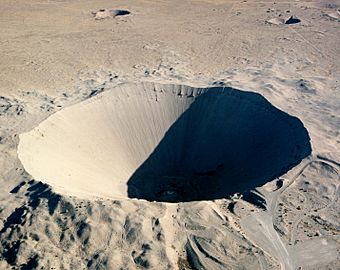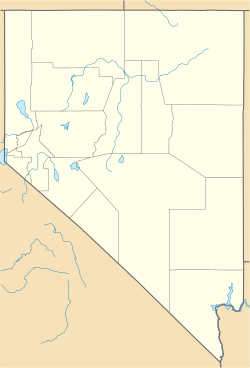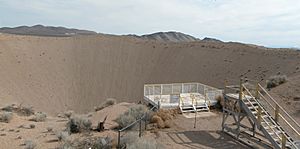Sedan Crater facts for kids
Quick facts for kids |
|
|
Sedan Crater
|
|

The Sedan crater
|
|
| Location | Area 10, Nevada Test Site |
|---|---|
| Nearest city | Mercury, Nevada |
| NRHP reference No. | 94000183 |
| Added to NRHP | March 21, 1994 |
The Sedan Crater is a huge hole in the ground made by a special kind of explosion. It's located at the Nevada Test Site, which is about 12 miles southwest of Area 51. This amazing crater was added to the National Register of Historic Places on March 21, 1994, because of its historical importance.
This giant crater was formed when about 12 million tons of earth were moved by the explosion. Today, more than 10,000 people visit the crater each year. They can take free tours offered every month by the U.S. Department of Energy. The Sedan Crater is similar to the Chagan crater in the former Soviet Union. The Chagan crater later filled with water to become Lake Chagan.
How the Sedan Crater Was Made
The Sedan Crater was created on July 6, 1962. It was formed by a very powerful explosion, equal to about 104,000 tons of TNT. This device was buried 635 feet deep in the desert floor. The explosion was part of a special project called the Plowshare Program. This program explored using nuclear explosions for peaceful purposes, like digging canals or creating harbors.
The Sedan explosion created a lot of "fallout." Fallout is tiny bits of dust and dirt that become radioactive and spread through the air. This particular test caused more fallout to affect people in the United States than any other nuclear test. Over 13 million people were exposed to some radiation from it. However, within seven months of the explosion, the bottom of the crater was safe enough to walk on without special protective clothing.
Plants Growing in the Crater
Inside the Sedan Crater, you can mostly find Russian thistle, which is also known as tumbleweed. Some grasses also grow there. Scientists studied the area in 1993. They found that the original shrubs that used to grow there had not grown back. This shows how powerful the explosion was and how much it changed the land.
Sedan Crater Facts
Here are some interesting facts about the Sedan Crater:
- Maximum depth: 320 feet (about the height of a 30-story building!)
- Maximum diameter: 1,280 feet (that's almost a quarter-mile wide!)
- Volume: 6.6 million cubic yards of earth were moved.
- Weight of material lifted: 12 million tons.
- Maximum lip height: 100 feet (the highest point around the edge of the crater).
- Minimum lip height: 20 feet (the lowest point around the edge).
See also
 In Spanish: Cráter Sedan para niños
In Spanish: Cráter Sedan para niños
 | Roy Wilkins |
 | John Lewis |
 | Linda Carol Brown |




